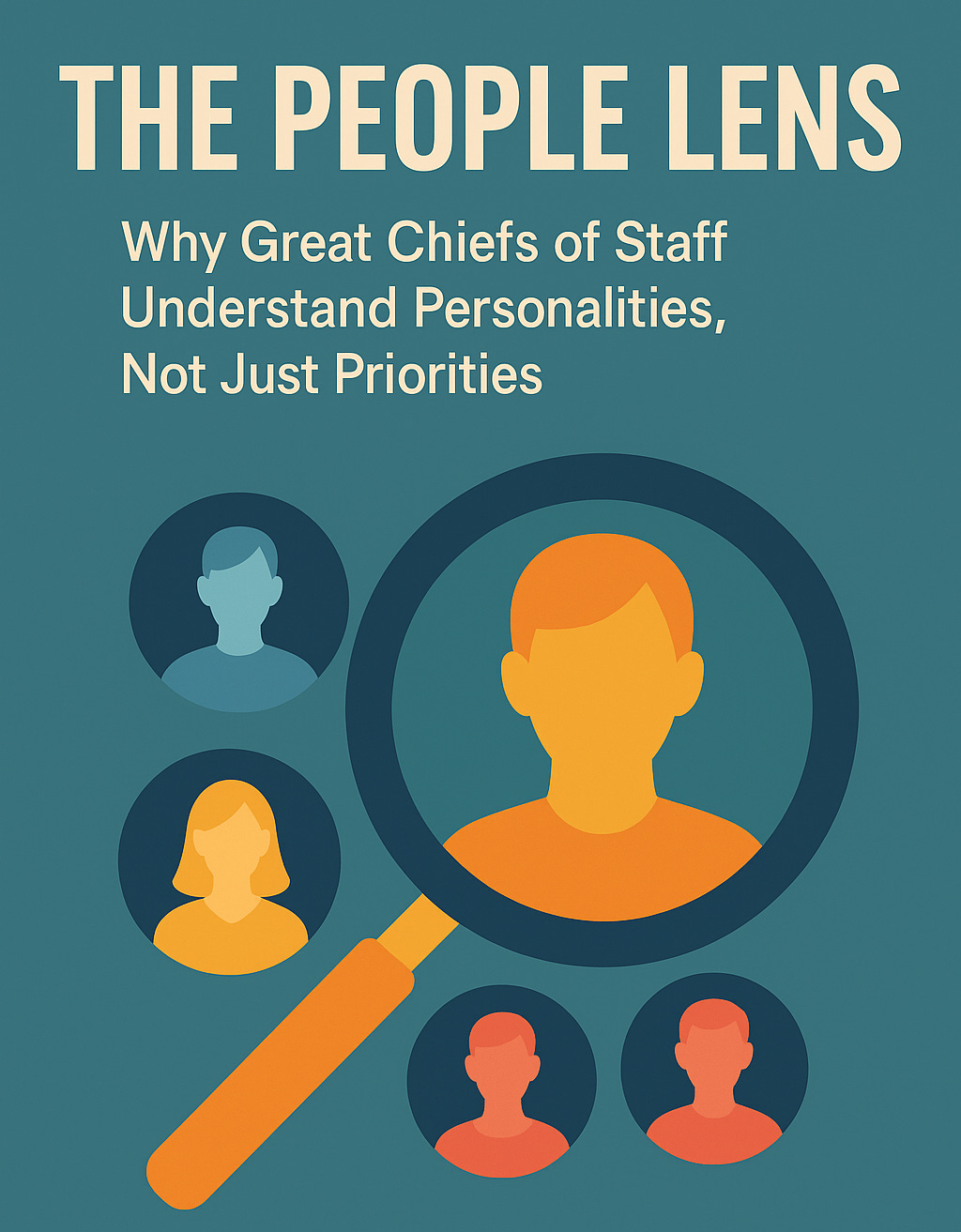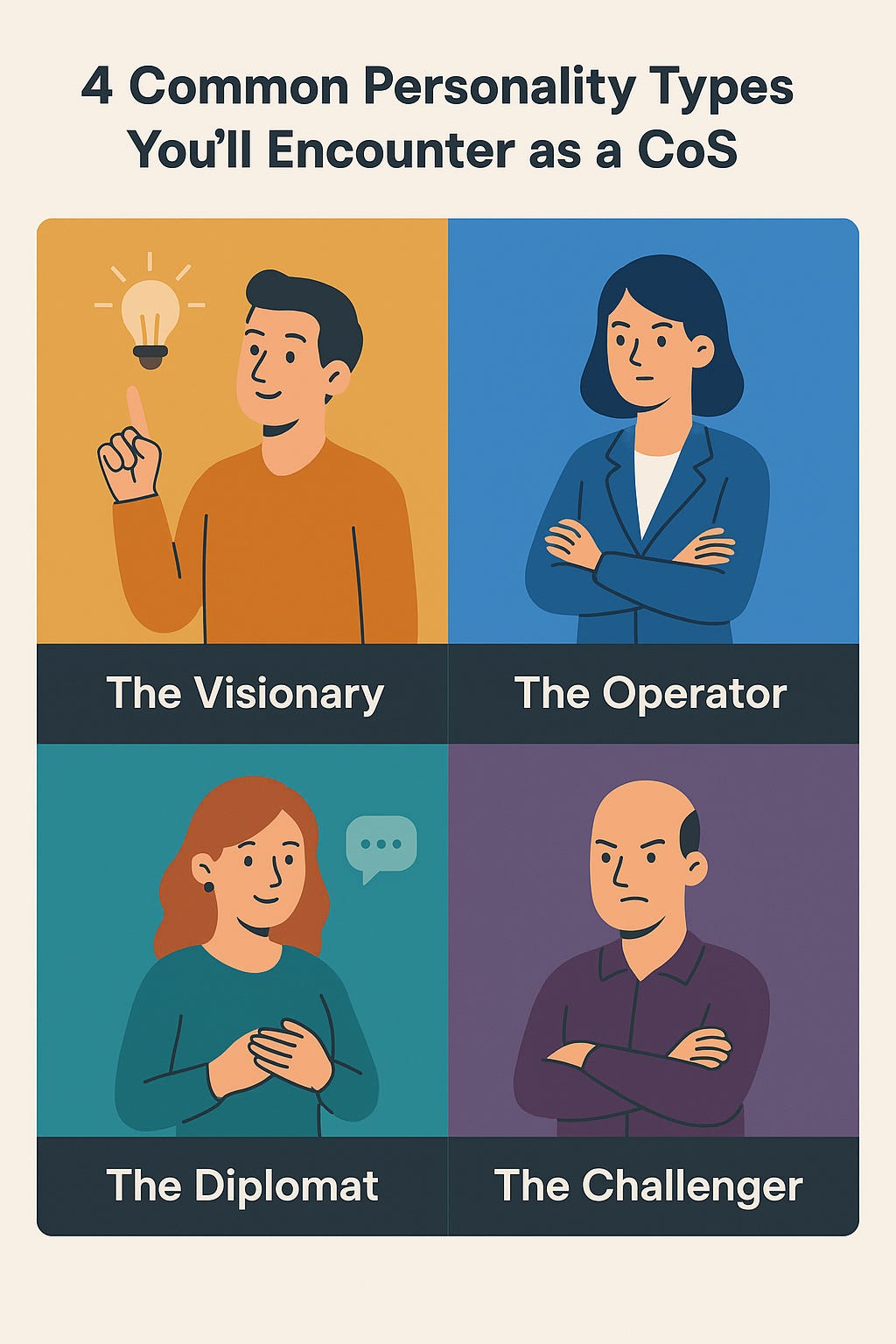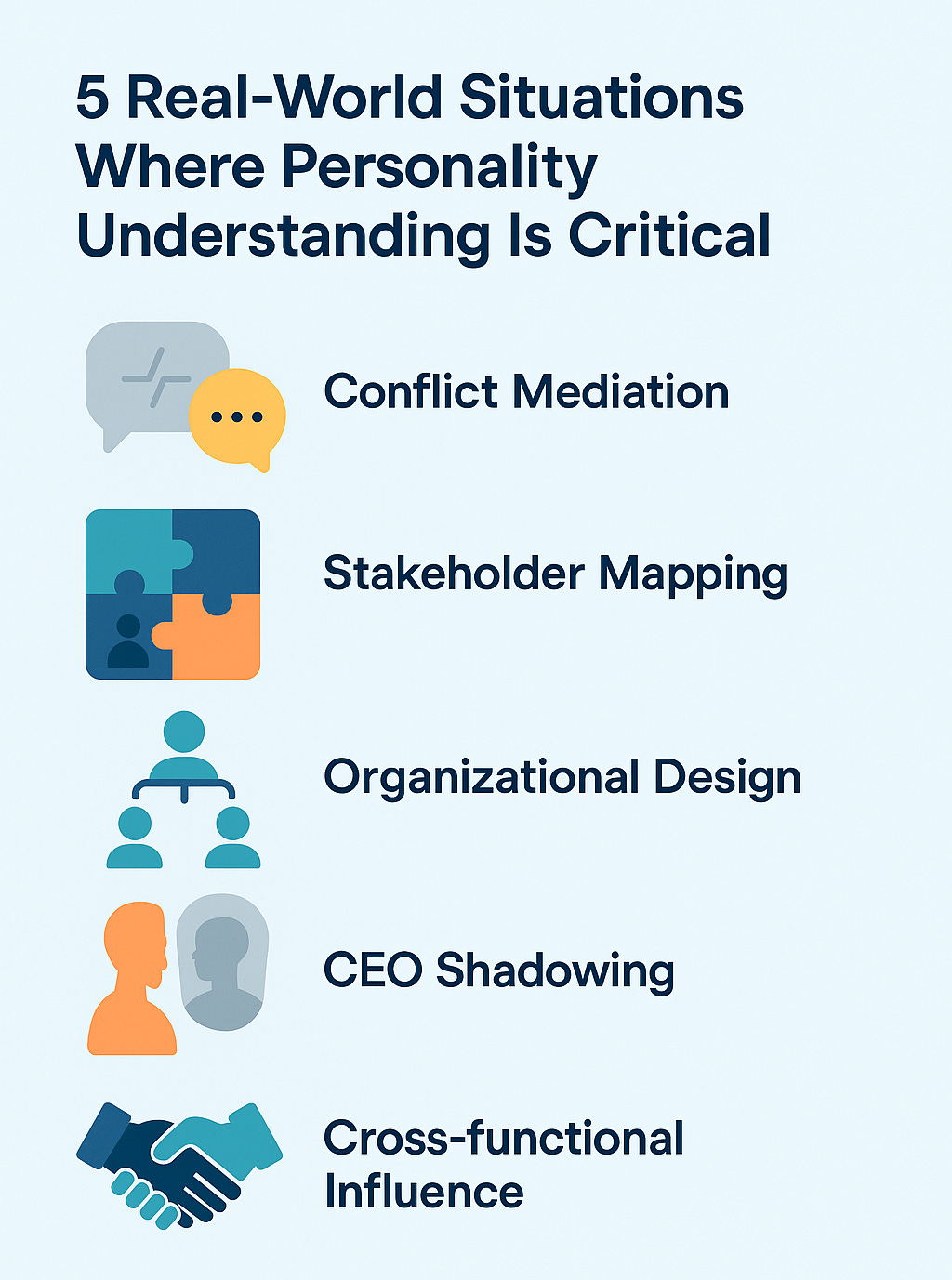Why Great Chiefs of Staff Understand Personalities, Not Just Priorities
Chief of Staff - Decoding Personality Types to Lead with Empathy, Navigate Complexity, and Drive Alignment at the Top.
In the ever-evolving, fast-paced corridors of leadership, a Chief of Staff isn’t just a master of strategy or execution they’re a master of people. From managing egos to uniting cross-functional teams, aligning senior stakeholders, or delivering difficult news with grace understanding personality types is a superpower every great CoS needs to wield.
Personality Intelligence in the CoS Role
In the realm of executive leadership, the Chief of Staff (CoS) is often described as the “power behind the curtain.” They don’t hold formal authority over most functions—but they influence everything from decision-making and org design to conflict resolution and cultural alignment. To succeed in this ambiguous, high-leverage space, one skill consistently stands out: Personality Intelligence.
What is Personality Intelligence?
Personality Intelligence is the ability to:
Recognize different personality types
Adapt your communication and leadership approach accordingly
Predict responses to pressure, conflict, change, or praise
Influence outcomes based on an understanding of people’s intrinsic motivations
It’s the superpower that makes a Chief of Staff not just a strategic operator, but a human integrator a bridge between diverse personalities, priorities, and political realities.
Why It Matters:
1. Influence Without Authority
CoS roles are defined by cross-functional influence. You can’t escalate everything to the CEO so you must shape conversations, align stakeholders, and get buy-in by connecting with people, not commanding them.
2. Decode What’s Unsaid
Whether it's an executive avoiding accountability or a senior leader resistant to change, personality insight helps you understand why someone is behaving a certain way and how to navigate it constructively.
3. Make Judgment Calls in Ambiguity
When data is insufficient and politics are thick, people patterns become your decision compass. Knowing who leads with emotion vs. data, who values speed vs. certainty, helps you guide outcomes smoothly.
4. Orchestrate Leadership Dynamics
From succession planning to org redesign, your role often involves recommending people for roles or pairing leaders together. Personality insight ensures you’re suggesting structures that work in real life, not just on an org chart.
5. De-Risk Conflict & Misalignment
By reading personalities early, you can proactively defuse tension, mediate conflict with empathy, and prevent team fractures before they grow.
Personality Frameworks
Why It Matters for Chiefs of Staff
As a Chief of Staff (CoS), you’re constantly navigating personalities: CEOs, function heads, high-potential talent, and underperformers all with different thinking styles, emotional wiring, and communication preferences.
Understanding personality frameworks helps you become a situationally adaptive leader someone who can read the room, decode behavior, and tailor communication for maximum impact. These models don’t box people in—they illuminate tendencies and motivations, which is essential for influence, conflict resolution, hiring, and stakeholder management.
Popular Personality Tools a CoS Can Use
1. MBTI (Myers-Briggs Type Indicator)
Classifies people across 4 dimensions (e.g., Introvert vs. Extrovert; Thinking vs. Feeling).
Helps you predict how someone prefers to make decisions, receive feedback, or approach ambiguity.
For example, you might brief a CEO who’s “NT” with sharp bullets and logic—but use more relational context with a “FJ.”
2. DISC Framework
Focuses on behavior: Dominance, Influence, Steadiness, Conscientiousness.
Useful in observing how stakeholders show up under stress, lead teams, or navigate collaboration.
Helps you resolve tensions between assertive and harmony-seeking leaders.
3. Enneagram
Centers around motivations, fears, and defense mechanisms.
It’s especially useful for anticipating how leaders respond under stress (e.g., a perfectionist will become more controlling; a people-pleaser may avoid conflict).
Helps with empathy and emotional calibration.
4. Big Five (OCEAN)
Most research-backed model: Openness, Conscientiousness, Extraversion, Agreeableness, Neuroticism.
It’s less about labeling and more about trait intensity—good for evaluating team fit, hiring, and culture building.
5 Situations Where Personality Insight Matters Most
The Chief of Staff (CoS) role demands more than sharp strategic thinking—it requires nuanced people-reading skills in complex, often high-stakes environments. Understanding personalities isn’t a “soft” skill in this context—it’s a strategic advantage.
Below are five real-world scenarios where personality intelligence helps a CoS excel behind the scenes and elevate leadership impact:
1. Conflict Mediation
Situation: Two senior leaders clash over ownership, approach, or priorities. Tension rises. Meetings become unproductive.
Why Personality Intelligence Helps:
Helps you assess whether the root issue is logic-driven (e.g., data, decision process) or emotion-driven (e.g., ego, perceived disrespect).
Allows you to tailor conflict resolution styles facilitating direct problem-solving for “Thinkers,” while creating space for validation and empathy with “Feelers.”
You become the neutral yet perceptive mediator someone who resolves tension before it escalates.
2. Stakeholder Mapping & Influence Strategy
Situation: You're driving alignment across a strategic project involving tech, product, HR, and finance leads all with different motivations.
Why Personality Intelligence Helps:
Enables you to map out not just the role-based power dynamics but also personality-based influence levers.
You can anticipate who might resist change, who needs social proof, who prefers details, and who responds to vision.
You adapt your narrative and timing to each persona, resulting in faster buy-in and fewer friction points.
3. Organizational Design & Succession Planning
Situation: Leadership is rethinking structure, or a key executive is stepping away. You’re involved in the succession conversation.
Why Personality Intelligence Helps:
You can spot compatibility (or friction) between potential leaders not just based on resumes but based on working style alignment.
Helps ensure people are placed in environments where they’ll thrive, not burn out.
Supports inclusive org design by factoring in diverse thinking and behavioral strengths.
4. CEO Shadowing & Leadership Support
Situation: You sit in high-level rooms and shadow the CEO across decisions, feedback loops, and team interactions.
Why Personality Intelligence Helps:
Helps you spot your CEO’s blind spots do they avoid conflict? Favor fast thinkers? Miss emotional cues?
Allows you to proactively fill those gaps brief them before tough conversations, slow them down when needed, or play “translator” for misunderstood stakeholders.
Enhances their leadership through your emotional radar.
5. Cross-functional Influence Without Authority
Situation: You’re leading a task force, initiative, or transformation effort with no direct reports.
Why Personality Intelligence Helps:
Builds trust by adjusting your tone and tempo: engineers may value precision, HR may value rapport, ops may want crisp ownership.
Influences across functions by speaking their language, understanding their psychological drivers.
Transforms you from “the person sending reminders” to “the strategic partner who gets them.”






